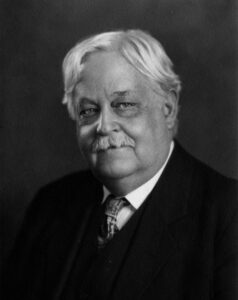 Edward B. Kinney
Edward B. Kinney
Born: March 9, 1863
Death: December 15, 1950
Place of Birth: New York City
Location of Death: New York City
Burial Location: No burial information
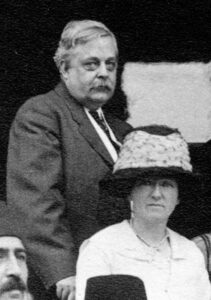 Carrie H. Kinney
Carrie H. Kinney
Born: Spring 1878
Death: August 16, 1959
Place of Birth: New York City
Location of Death: River Edge, New Jersey
Burial Location: No burial information
Edward B. Kinney (beloved Saffa) was born of an old New York family in the Spring of 1863, the spring of Bahá’u’lláh’s epoch-making Declaration in the Ridvan. As though by coming at such a moment into the world, Saffa was gifted with unusual genius. His genius found two channels of expression-in this material world through the greatest of all arts, music, with its spiritural source: in the region of the soul through that purest evidence of faith which the human spirit can manifest: an immediate recognition of the Messenger of God and a life wholly devoted to Him.[1]
Edward was a wealthy New Yorker and a musician who was introduced to the Bahá’í Faith by Howard MacNutt in the winter of 1895. That same evening Edward wrote to ‘Abdu’l-Bahá confirming his belief. His wife Carrie became a Bahá’í shortly afterwards. They were married on April 20, 1899 and had three sons named Edward Jr. (went by the name Sanford), Howard and Donald. ‘Abdu’l-Bahá named Edward ‘Saffa’ (serenity) and Carrie ‘Vaffa’ (certitude).
In 1907 ‘Abdu’l-Bahá asked the Kinneys to go to Egypt to help Zia Bagdadi establish the first tuberculosis hospital in Alexandria. On their return to New York, their large home located at 780 West End Avenue became a meeting place for Bahá’ís. ‘Abdu’l-Bahá gave His first talk in America here on April 11, 1912. [2]
By the time the S.S. Cedric docked, a crowd of Bahá’ís had been waiting for hours, eager to meet ‘Abdu’l-Bahá. Mr. Edward Kinney was called forth to board the ship, and he returned with a message from the Master that He would meet the friends at the home of Mr. Kinney at four o’clock.
‘Abdu’l-Bahá and His entourage were driven from the ship to the Hotel Ansonia, Broadway and 73rd Street, His headquarters for the next nine days of incredibly intense activities. After resting and having a cup of tea, He was taken to the home of Mr. and Mrs. Edward B. Kinney, where hundreds of Bahá’ís had gathered. “Almost everyone was weeping just at the sight of Him.” The Master addressed a warm welcome to all, then had a few words with each one. [3]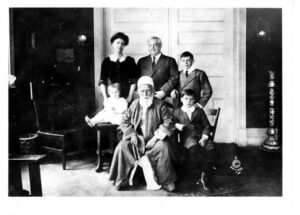
“They spared neither time nor effort or money to have everything as well arranged for ‘Abdu’l-Bahá as possible during His sojourn in New York City.” Shoghi Effendi called Mr. and Mrs. Kinney “Pillars of the Faith in the City of the Covenant” and “Pillars of the Cause of God.”[4]
‘Abdu’l-Baha’s first address on American soil was in the Kinney home:
How are you? Welcome! Welcome!
After arriving today, although weary with travel, I had the utmost longing and yearning to see you and could not resist this meeting. Now that I have met you, all my weariness has vanished, for your meeting is the cause of spiritual happiness.
I was in Egypt and was not feeling well, but I wished to come to you in America. My friends said, “This is a long journey; the sea is wide; you should remain here.” But the more they advised and insisted, the greater became my longing to take this trip, and now I have come to America to meet the friends of God. This long voyage will prove how great is my love for you. There were many troubles and vicissitudes, but, in the thought of meeting you, all these things vanished and were forgotten.
I am greatly pleased with the city of New York. Its harbor entrance, its piers, buildings and broad avenues are magnificent and beautiful. Truly, it is a wonderful city. As New York has made such progress in material civilization, I hope that it may also advance spiritually in the Kingdom and Covenant of God so that the friends here may become the cause of the illumination of America, that this city may become the city of love and that the fragrances of God may be spread from this place to all parts of the world. I have come for this. I pray that you may be manifestations of the love of Bahá’u’lláh, that each one of you may become like a clear lamp of crystal from which the rays of the bounties of the Blessed Perfection may shine forth to all nations and peoples. This is my highest aspiration.
It was a long, long trip. The more we traveled, the greater seemed the expanse of the sea. The weather was brilliant and fine throughout; there was no storm and no end to the sea.
I am very happy to meet you all here today. Praise be to God that your faces are shining with the love of Bahá’u’lláh. To behold them is the cause of great spiritual happiness. We have arranged to meet you every day at the homes of the friends.
In the East people were asking me, “Why do you undertake this long voyage? Your body cannot endure such hardships of travel.” When it is necessary, my body can endure everything. It has withstood forty years of imprisonment and can still undergo the utmost trials.
I will see you again. Now I will greet each one of you personally. It is my hope that you will all be happy and that we may meet again and again.”[5]
There were so many historic happenings that involved the Kinneys and ‘Abdu’l-Baha, here are a few:
- Several important talks in the City of the Covenant were recorded in The Promulgation of Universal Peace and took place in the Kinneys’ home.
- When the Master fell asleep on John Bosch’s shoulder during an automobile drive in New York, that drive ended at the Kinneys’ home.
- When the Master told Howard MacNutt, who had followed Khayrullah and then came back to the Covenant, and for a bountiful reward was directed to compile all of the Master’s addresses into The Promulgation of Universal Peace — when the Master told Mr. MacNutt to go and tell the people, “I was like Saul, now I am Paul” — that was at the Kinneys’ house, as recounted here.
- In the movie of Abdu’l-Baha at the MacNutt home in Brooklyn, Mr. Kinney and Mr. Getsinger at the beginning of the movie are together walking up the sidewalk after the Master does.
- And the experience of Howard Colby Ives which took place in the Kinneys’ home is described below:
Not long after that great first experience with ‘Abdu’l-Bahá I was again talking with Him. It was in the beautiful home of Mr. and Mrs. Kinney, a family of the friends who seemed to feel that the gift of all which they possessed was too little to express their adoring love. Entering their home the roar of the city, the elegance and luxury of Riverside Drive, the poverty and wealth of our modern civilization all seemed to merge into a unity of nothingness and one entered an atmosphere of Reality. Those heavenly souls who thus demonstrated beyond any words their self-dedication had a direct influence upon my hesitating feet of which they could have had no suspicion. My heart throughout all worlds shall be filled with thankfulness to them.
In this home I had become a constant habitue. I could not keep away. One day ‘Abdu’l-Bahá, the interpreter and I were alone in one of the smaller reception rooms on the ground floor. ‘Abdu’l-Bahá had been speaking of some Christian doctrine and His interpretation of the words of Christ was so different from the accepted one that I could not restrain an expression of remonstrance. I remember speaking with some heat: “How is it possible to be so sure?” I asked. “No one can say with certainty what Jesus meant after all these centuries of misinterpretation and strife.” He intimated that it was quite possible. It is indicative of my spiritual turmoil and my blindness to His station, that instead of His serenity and tone of authority impressing me as warranted it drove me to actual impatience. “That I cannot believe.” I exclaimed. I shall never forget the glance of outraged dignity the interpreter cast upon me. It was as though he would say: “Who are you to contradict or even to question ‘Abdu’l-Bahá!” But not so did ‘Abdu’l-Bahá look at me. How I thank God that it was not! He looked at me a long moment before He spoke. His calm, beautiful eyes searched my soul with such love and understanding that all my momentary heat evaporated. He smiled as winningly as a lover smiles upon his beloved, and the arms of His spirit seemed to embrace me as He said softly that I should try my way and He would try His.
It was as though a cool hand had been laid upon a fevered brow; as though a cup of nectar had been held to parched lips; as though a key had unlocked my hard-bolted, crusted and rusted heart. The tears started and my voice trembled, “I’m sorry,” I murmured.
Often since that day have I pondered on the tragic possibilities of the effect of an expression of the face. I have even thought I should like to write a book on The Glance that Saved the World, taking as a theme the way Jesus must have looked upon Peter after the three-fold denial. What could that glance have carried to the fear-stricken, doubting, angry Peter? Surely not the self-righteous, dignified look in the eyes of the interpreter for ‘Abdu’l-Bahá. As surely it must have been something in the nature of the expression of all-embracing love, forgiveness and understanding with which ‘Abdu’l-Bahá calmed and soothed and assured my heart. [6]
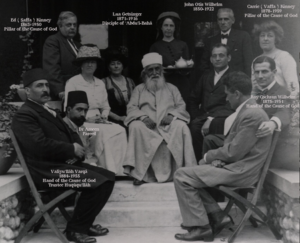
6. Juliet Thompson records in her diary that during her Pilgrimage to the Holy Land, which the Kinney family were fellow-pilgrims, were recorded here:
First, with a father’s tender care, He came to the carriage with us and watched us start. At the house in Bahji He joined us in a cool, whitewashed room, its door and window-trimmings painted blue, the usual linen-covered divan lining its walls, under three wide windows. Outside stood wonderful trees, like still sentinels guarding the Tomb. Sanctity hung in the air, a brooding spirit. Nowhere else in the world is the beauty of nature so impregnated with the soul of Beauty, a reflection from another world. In the air of ‘Akká and Carmel is — Life.
On a table was a single photograph, Lua’s. Our Lord called me to sit by His side, then, pointing to the photograph, said: “Your friend!”
I got it and placed it on a little table close to His elbow, between the couch where He sat and my own chair. As I did this His face lit up with a smile of heaven.
Tea was brought in — in the little clear glasses always used in ‘Akká — and He served us with His own hands. Then, seating Himself again on the divan, He called the four children who were with us: two of his own little grandsons (Shoghi Effendi and Ruhi) and the two Kinney boys, and with a lavish tenderness, a superabundance of overflowing love, such as could only have come from the very Centre and Source of Love, He drew all four to His knees, clasped them in His arms, which enclosed them all, gathered and pressed and crushed them to His Heart of hearts. Then He set them down on the floor and, rising, Himself brought their tea to them.
`Words absolutely fail me when I try to express the divine picture I saw then. With the Christ-love radiating from Him with the intensest sweetness I have yet witnessed, He stooped to the floor Himself to serve the little children, the children of the East and the children of the West. He sat on the floor in their midst, He put sugar into their tea, stirred it and fed it to them, all the while smiling celestially, an infinite tenderness playing on the great Immortal Face like white light. I cannot express it! In a corner sat an old Persian believer, in a state of complete effacement before his Lord, his head bowed, his eyelids lowered, his hands crossed on his breast. Tears were pouring down his cheeks.[1]
7. ‘Abdu’l-Bahá deplored the racial segregation prevalent in the United States and He “strongly urged the friends to associate with each other in the utmost joy and happiness.” He called for such a gathering, and it took place Wednesday, April 17, at the home of Mr. and Mrs. Kinney, where Bahá’ís and their friends of both the black and white races met in unity. He prepared and served the meal Himself, speaking of the human family as “a garden of flowers of various hues.” The Master was most happy and the spirit of the friends was high. It was felt that this was a landmark in the city. This memorable event was followed by a public address at the hotel. [2]
Mr. Kinney recounted that the New York Spiritual Assembly met in the Kinney home:
Mr Kinney: “The Board of Council has met for three years past in my studio and I am very proud of it.”
Our Lord: “It is indeed worthy to be proud of. I hope your home may always be the place of the gatherings; that the beloved of God may always come together there, be engaged in commemoration of God, have heavenly talks and speak through the confirmation of the Holy Spirit. Your home will be one of the heavenly constellations, Insha’llah, and the stars will gather there.”
Mr Kinney: “What could I ask for more?”
Our Lord: “There is nothing superior to this.”
The Master permitted the Kinneys to remain as pilgrims in the Holy Land for eight months during 1906. They asked Him for the privilege of returning the favor, imploring Him to visit America, and when He did, to stay as a guest in their home. He did, and while in their home in New York He told Mrs. Kinney, “I am returning your visit, but while I am in your home I will be the host and you will be the guests.” [1]
On the occasion of Saffa Kinney’s passing, Shoghi Effendi cabled to the Baha’i world:
GRIEVE PASSING DEARLY LOVED, HIGHLY ADMIRED, GREATLY TRUSTED, STAUNCH, INDEFATIGABLE, SELF-SACRIFICING TEACHER, PILLAR FAITH, SAFFA KINNEY. HIS LEONINE SPIRIT, EXEMPLARY STEADFASTNESS, NOTABLE RECORD SERVICES ENRICHED ANNALS CLOSING PERIOD HEROIC AGE OPENING PHASE FORMATIVE AGE BAHA’I DISPENSATION. BOUNTIFUL REWARD ASSURED ABHA KINGDOM BENEATH SHADOW MASTER HE LOVED SO DEARLY, SERVED SO NOBLY, DEFENDED SO HEROICALLY UNTIL LAST BREATH. SHOGHI [7]
That beautiful scene recounted in Portals to Freedom when Howard Colby Ives followed the Master up the stairs when the Master was so tired, and asked Him about Renunciation, was in the Kinneys’ home.
One day the Master asked Saffa Kinney to walk with Him on Riverside Drive. He stopped and looking deep in to Saffa’s eyes asked in heart-piercing tones, “Do you love Me? Do you love Me? Do you love Me?”
The next-to-last talk of the Master on America’s shores on December 3, 1912 took place at the Kinneys’ home:
I am greatly pleased with you all and rejoice that you have shown me the utmost kindness and affection. It is my desire that Bahá’u’lláh shall be pleased with you, that you may follow His precepts and become worthy of His confirmations. The requirements are that your minds must be illumined, your souls must be rejoiced with the glad tidings of God, you must become imbued with spiritual moralities, your daily life must evidence faith and assurance, your hearts must be sanctified and pure, reflecting a high degree of love and attraction toward the Kingdom of Abha. You must become the lamps of Bahá’u’lláh so that you may shine with eternal light and be the proofs and evidences of His truth. Then will such signs of purity and chastity be witnessed in your deeds and actions that men will behold the heavenly radiance of your lives and say, “Verily, ye are the proofs of Bahá’u’lláh. Verily, Bahá’u’lláh is the True One, for He has trained such souls as these, each one of which is a proof in himself.” They will say to others, “Come and witness the conduct of these souls; come and listen to their words, behold the illumination of their hearts, see the evidences of the love of God in them, consider their praiseworthy morals, and discover the foundations of the oneness of humanity firmly implanted within them. What greater proof can there be than these people that the message of Bahá’u’lláh is truth and reality?” It is my hope that each one of you shall be a herald of God, proclaiming the evidences of His appearance, in words, deeds and thoughts. Let your actions and utterances be a witness that you are of the Kingdom of Bahá’u’lláh. These are the duties enjoined upon you by Bahá’u’lláh.
Bahá’u’lláh endured the greatest hardships. He found neither rest by night nor peace by day. He was constantly under the stress of great calamity — now in prison, now in chains, now threatened by the sword — until finally He broke the cage of captivity, left this mortal world and ascended to the heaven of God. He endured all these tribulations for our sakes and suffered these deprivations that we might attain the bestowals of divine bounty. Therefore, we must be faithful to Him and turn away from our own selfish desires and fancies in order that we may accomplish that which is required of us by our Lord.[8]
This prayer (below) is believed to have been given to Edward “Saffa” Kinney by ‘Abdu’l-Bahá. The Research Department of the Universal House of Justice states that the original of the prayer does not bear the name of the recipient, though it is likely it was revealed for a western believer because the Master signed it in the roman alphabet. The original was published in Persian in “Muntakhabat-i-Matatib”, vol. 2, Page 16, number 24. The translation below is an authorized translation. This prayer can therefore be considered and used as authentic and authoritative.
O Thou beloved of my heart and soul! I have no refuge save thee. I raise no voice at dawn except in thy commemoration and praise. Thy love encompasseth me and Thy Grace is perfect. My hope is in Thee.
Oh God, give me a new life at every instant and bestow upon me the breaths of the Holy Spirit at every moment, in order that I may remain steadfast in Thy love; attain unto great felicity, perceive the manifest light and be in the state of utmost tranquillity and submissiveness.
Verily, Thou art the Giver, the Forgiver, the Compassionate. -‘Abdu’l-Bahá
Sources:
1 Baha’i Publishing Trust. 1950-1954 A.D. The Baha’i World Faith, Volume XII, p.679
2 Poirer, Brent. “Abdu’l-Baha, and Saffa and Vafa Kinney”, bahai-insights.blogspot.com 2010
3 Lacroix-Hopson, Eliane. “‘Abdu’l-Baha in New York”, Bahai-Library.com: Winters, Jonah
4 Bahá’í World XII, pp. 678-9; and Bahá’í World XIII, p.865.
5 Harris, Hooper. “11 April 1912 Talk at Home of Mr. and Mrs. Edward B. Kinney”, reference.bahai.org
6 Ives, Howard Colby. “Portals to Freedom,” pp. 36 ff. Baha’i Publishing Trust, 1937.
7 http://reference.bahai.org/en/t/se/CF/cf-38.html
8 http://reference.bahai.org/en/t/ab/PUP/pup-137.html
Images:
Baha’i World Centre Archives
Courtesy of Wilhelm Properties



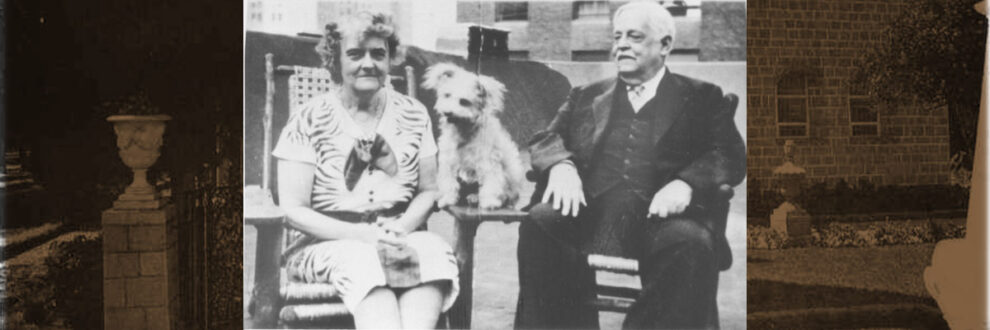

Add Comment